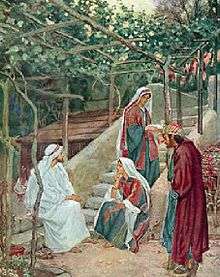Nazar (given name)
 Nazar as used by Christians is derived from the town of Nazareth, where Jesus Christ is said to have lived. | |
| Gender | male |
|---|---|
| Origin | |
| Meaning | from Nazareth |
| Region of origin | worldwide |
| Other names | |
| Related names | Naz, Nazik, Nazaire, Nazario, Nazarius, Nazariy, Nazaret, Nazret |
Nazar is a masculine name with multiple origins.
Christian use
As used by Christians, it means "from Nazareth," the town where Jesus Christ was said to have lived. The etymology of Nazareth from as early as Eusebius up until the 20th century has been said to derive from the Hebrew word נצר netser, meaning a "shoot" or "sprout", while the apocryphal Gospel of Phillip derives the name from Nazara meaning "truth".[1]
Nazario is an Italian and Spanish version of the name, Nazaire is a French version and Nazariy is a Ukrainian and Russian form. Other variants in use include Naz, Nasareo, Nasarrio, Nazaret, Nazarie, Nazaro, Nazarene, Nazerine and Nazor. Nazret, the Amharic word for Nazareth, is also occasionally used as a female name in Ethiopia and Eritrea, while Nazaret is also occasionally used as a name for girls in Spanish-speaking areas. According to the web site behindthename.com, all are derived from the name Nazarius, which was in use in late Roman times and was also the name of some early Christian saints and martyrs.[2][3] In 2008, Nazar was the most popular name for boys born in Ukraine.[4]
Arabic use
Nazar is an Arabic name. There is no direct meaning for the name Nazar in Arabic but it is believed that it might be driven from the verb ((نَزَرَ)) -pronounced as- Nozer which can refer to different meaning as detailed in the Arabic dictionary such as (1) the little thing or reducing the amount of something; for example the verb Nozer can be used in a sentence to refer to the season with less rain, also to describe a quiet person who is talk just a little, or the female with least number of children (In the culture of the Arab world, the number of households believed to be >4) (2) the verb (Nozer) has the meaning of insisting in asking for something (repeatedly) such as for food, or a help, or for a favor etc., (3) the name Nazar has no link or reference in Islam (4) Some people(Non-Arabic-speaking) may mix between the name (Nazar) and the word Nadhar = نظر that means (eyesight/the ability to see) but in the Arabic language they are totally different words and they have totally different meaning. Therefore, the same pronunciation of the name (Nazar) could be found in the language of other non-Arabic-speaking population who through the influence of Islam adopted some Arabic words such as نظر = pronounced as (Nadhar) with its meaning (eyesight/the ability to see) which is not the same name Nazar in Arabic and it is clear that they can tell the difference as they do not speak Arabic.
Other use
It was explained above that there is confusion in non-Arabic speaking nations that have been influenced by Islam and still use some Arabic words. They mix up the words Nadhar/eyesight (see below; the evil eye stone which is from the verb seeing/Nadhar not the name Nazar) and the name Nazar. I am leaving the section below which it seems has been introduced mistakenly by a non-Arabic speaking editor so different readers can correct themselves or others from such confusion or mixing of these words.
( Nazar, or evil eye stone, is an amulet of stone or glass which is believed to protect against evil eye, widely used in Greece, Iran, Turkey, Kazakhstan, Azerbaijan and other Turkic-speaking countries, Pakistan and Afghanistan, therefore this name implies that the male named Nazar should be wise and handsome. )
People
- Alejandro Nazar Garza (multiinstrumentalist) (4 September 1983... 20th century. Producer and founder of Postfuturism Labs.
- Saint Nazarius (Roman Martyrology), saint of the Roman Catholic Church, mentioned in the Martyrology of Bede and earlier editions of the Roman Martyrology
- Saint Nazarius (Abbot), fourteenth abbot of the monastery of Lérins
- Saints Nazarius and Celsus, two martyrs of whom nothing is known except the discovery of their bodies by Saint Ambrose
- Nazar Al Baharna (born 1950), Bahraini academic, entrepreneur and politician
- Nazar Baýramow (born 1982), Turkmenistani footballer
- Nazar Aljabar (born 1980), Iraqi researcher in Civil Engineering at Monash University-Australia.
- Nazar Mahmud (born 1988), Israeli-Druze figure skater
- Nazar Mohammad (1921–1996), Pakistani cricketer
- Nazaret Daghavarian (1862-1915), born Chaderjian, Armenian doctor, agronomist and public activist, and one of the founders of the Armenian General Benevolent Union
- Nazario Escoto, acting President of "Democratic" Nicaragua after the death of Francisco Castellón during Granada-León civil war
- Nazario Sauro (1880–1916), Austrian-born Italian irredentist and sailor
- Nazario Toledo (1807-1887), Costa Rican politician
- John Paul Nazarius, Dominican theologian
- Nazariy Yaremchuk (1951–1995), Ukrainian singer
- Nazar Ibn Ma'ad (ancestor of Mudhar tribes)
- Ruzi Nazar (CIA agent who was supposed to have Uzbek origin)
- Nursultan Nazarbayev (First president of Republic of Kazakhstan)
See also
References
- GosPh 56.12; 62.8, 15; 66.14. See J. Robinson (ed.), The Nag Hammadi Library in English, Harper & Row 1977, pp. 131-151.
- Behind the Name
- Catholic Online
- http://www.unian.net/eng/news/news-297589.html
- https://www.almaany.com/ar/name/%D9%86%D8%B2%D8%A7%D8%B1/
- https://www.maajim.com/dictionary/%D9%86%D8%B2%D8%A7%D8%B1